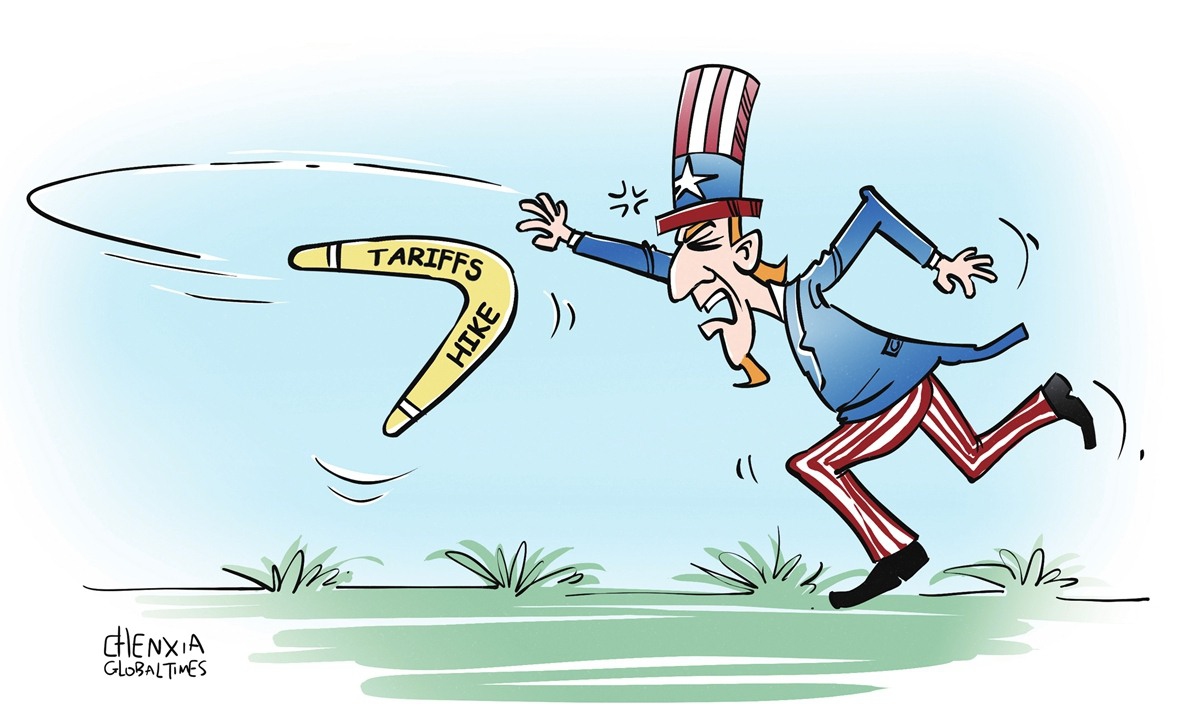
Illustration: Chen Xia/GT
The
mk fantasy of some US politicians, who view tariffs as a means to substantially boost tax revenue, reveals a gross overestimation of the sway held by the US consumer market.
The long-term implications of trade protectionist policies could be far more damaging than expected, as the negative impact of tariffs on consumption will likely erode US competitiveness in the global economic order, prompting other countries to expedite efforts to readjust their supply chains and lessen their reliance on the American consumer market.
White House aide Peter Navarro said that he expected US tariffs to bring in $6 trillion in revenue in the next decade, which could amount to the largest tax hike in US history, CNN reported on Monday.
Such a claim, coming just days before the US government's scheduled imposition of so-called reciprocal tariffs on other countries on Wednesday (US time), is only a unilateral estimate that does not take into account factors including the decline in imports caused by the increased tariffs and the response measures from other countries.
The assumption reveals a misunderstanding and disregard of how tariffs function and their long-term consequences. Imposing additional tariffs will inflict greater losses on American businesses and consumers. In essence, the so-called $6 trillion in revenue is actually a "hidden consumption tax" on consumers.
The US administration's tariff policy suffers from a self-defeating contradiction. While the administration claims tariffs will force the return of US manufacturing, the resulting costs will erode the competitiveness of domestic industries and undermines its own industrial goals.
The fatal flaws in US tariff policies lie in the blind optimism and overestimation of the consumption capacity of the US market. US policymakers believe that even if tariffs are substantially increased, the volume of imports will remain unaffected. However, the basic law of supply and demand in economics clearly shows that an increase in price, which is very likely, will inevitably suppress demand.
Many economists have warned that in the short to medium term, the prices of imported goods in the US will continue to rise, while it will take time for domestic production to catch up and substitute for imports. This will seriously harm the interests of US consumers, because the price hikes caused by tariffs will continuously erode their purchasing power.
In the fourth quarter of 2024, personal consumption expenditures represented nearly 68 percent of US GDP. Given this reality, it is not hard to conceive that market vitality will be severely suppressed if consumption feels the persistent economic burden of tariffs.
Moreover, the dampened outlook for the US consumer market is having a profound impact on the US economy. It also poses a risk of accelerating the decline of US influence in the global trade order while prompting other countries to reduce their reliance on the American market.
Countries around the world are actively pursuing strategies to mitigate the impact of tariffs, which includes looking for alternative sources of demand. Some are exploring new markets and expanding their global trade footprints, seeking to tap into the potential of emerging market economies in order to reduce reliance on the US market. Others are trying to establish more open regional markets by strengthening regional economic cooperation to share resources and boost overall regional economic competitiveness.
In addition, countries like China with huge markets are also focusing on developing their domestic markets, aiming to stimulate local demand and enhance economic self-reliance. For instance, China in January released a guideline for building a unified national market, breaking down barriers to boost domestic demand while enhancing openness, according to the Xinhua News Agency.
The size and influence of the US market could mean that it's still challenging to replace in the short term, but if the US continues to adopt unilateral and protectionist trade policies, sooner or later other countries will accelerate efforts to rebalance away from it.

